 Serbian unions said on Thursday they would stage mass protests within two weeks unless government officials take their share of spending cuts agreed last week to secure an IMF loan.
Serbian unions said on Thursday they would stage mass protests within two weeks unless government officials take their share of spending cuts agreed last week to secure an IMF loan.
Serbia plans to freeze wages and pensions for 18 months and impose a 6 percent income tax surcharge to achieve spending cuts of 1 billion euros, the conditions set by the International Monetary Fund on a two-year 3-billion-euro loan.
“The austerity measures will not be accepted and trade unions refuse to be just bystanders any longer,” said Slavica Zivanovic, representing the judiciary workers’ union.
“The least we can do is to stage a protest,” said teachers’ trade union leader Branislav Pavlovic.
Trade unions representing 530,000 teachers, judges, doctors and police, all paid out of the state budget, said their monthly income had fallen by 20 percent due to the sinking dinar and they would not shoulder any additional burden.
One of two police unions, representing 10,000 officers, said it did not rule out taking part in the protests.
Trade unions want the government to almost double the minimum wage for state sector employees, cut spending on cars, phone bills, petrol and business travel for government administrative workers, and reduce the number of government agencies and part-time administrative staff.
After a public outcry, the Finance Ministry has held a series of meetings this week to rework the savings.
PESSIMISM
Belgrade daily Politika said the government also planned to cut ministries’ budgets by 25 percent and sack 6,000 or almost 20 percent of administrative workers by January 2010.
Labour Minister Rasim Ljajic told Tanjug news agency the government would make savings through lower wages in public administration and higher excise duties on petrol and phone bills, as well as from property taxes to ensure 100 billion dinars or one billion euros worth of savings.
The cuts will make sure Serbia’s fiscal gap falls to 3 percent of GDP in a year of recession.
“I think we have achieved a right measure to avoid that the main burden of the crisis falls on the poorest,” Ljajic said.
But after its first session following last Thursday’s pledge to the IMF to cut costs, the government unveiled no final plan.
“The government discussed no cost cutting specifics,” Defence Minister Dragan Sutanovac said.
The coalition of pro-Western parties and the Socialists of late autocrat Slobodan Milosevic has to agree the cost cutting and submit the plan both to parliament for approval and the IMF, whose board is due to discuss the loan to Serbia in May.
An opinion poll by the Belgrade-based Strategic Marketing pollster on Thursday showed growing pessimism about the impact of the crisis, with the number of people concerned rising to 65 percent in March from 51 percent last October.
The IMF loan deal was vital for Serbia to win a pledge from its top ten commercial creditors last Friday to roll over more than five billion euros in credit to Serbia’s private sector banks and companies which mature in 2009.
 Eurasia Press & News
Eurasia Press & News



